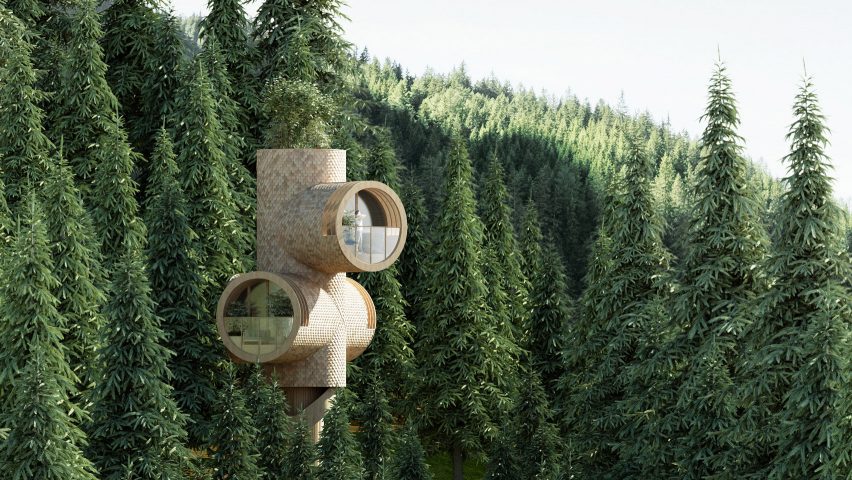Architecture studio Precht has unveiled Bert, a conceptual modular treehouse shaped like a tree trunk, with large round windows designed to make it look like the single-eyed character from the film Minions.
Precht, co-founded by husband and wife team Chris and Fei Tang Precht, designed the system called Bert for tiny-homes startup Baumbau.
Bert is designed to sit on a circular base, with tube-shaped modular cells containing kitchens, living space, bedrooms and bathrooms that can be stacked over and around it like the limbs of a tree branching out from the trunk.
The treehouse would be made from wood, with leaf-like shingles to help it blend in with a forest setting.
If used for an off-grid retreat, solar panels would be installed on the roof and composting toilets added at ground level.
Interiors are designed to be dark and cosy, with large round windows and balconies like the eyes of a cartoon character to frame views of the landscape.
"We are fully aware that architecture is this serious and profound craft with a long culture and tradition. You see that when we architects find reference for our projects in art, philosophy, literature or nature," said Precht co-founder Chris Precht.
"For this project, we also looked at art to find reference. But not at Michelangelo or Dali. Rather we looked at cartoon characters of Sesame Street or Minions."
Minions are the little yellow henchmen who wear distinctive eye-goggles, who star in the computer-animated children's comedy film series Despicable Me. Bert is the name of a puppet character from the educational tv show Sesame Street.
Precht started the design process by imagining a child's drawing of a treehouse.
"As architects, no matter if young or old, we have an inner child that looks at the world with playfulness and curiosity," said co-founder Fei Tang Precht. "That same curiosity gave birth to Bert."
Bert is designed to be pre-fabricated off-site in a factory then assembled in situ. More modules could be added and stacked on top of each other to expand each treehouse.
The modules can exist in small, self-contained arrangements as tiny homes, or turned into larger homes or even communities.
As well as off-grid retreats, Precht suggested the Bert system could be used for hotels or multi-family living arrangements in cities.
If wood isn't easily available where the treehouse is due to located, the architects suggested steel could be used instead of timber for the main structure.
The first modules will be rolled out in the spring of 2020.
Chris and Fei Tang Precht, along with Dayong Sun, established architecture studio Penda in China in 2013. In 2017 the studio split into two with Chris and Fei Tang Precht moving to Austria to establish Precht. The studio recently designed a modular housing system that could support vertical farms to allow urban communities to grow their own food.
Graduate architect Matthew Chamberlain designed a concept for treehouse pods that could be built into trees on city streets to provide starter homes or homeless shelters.

